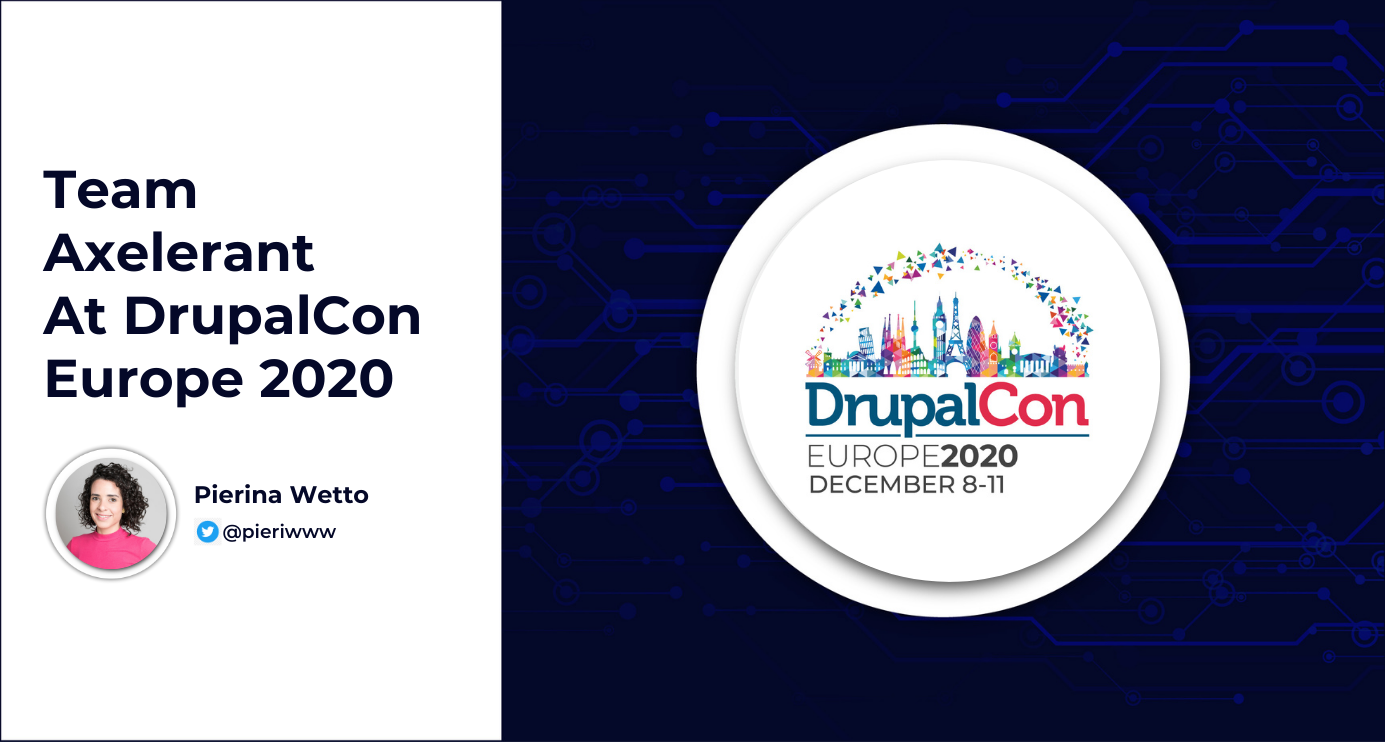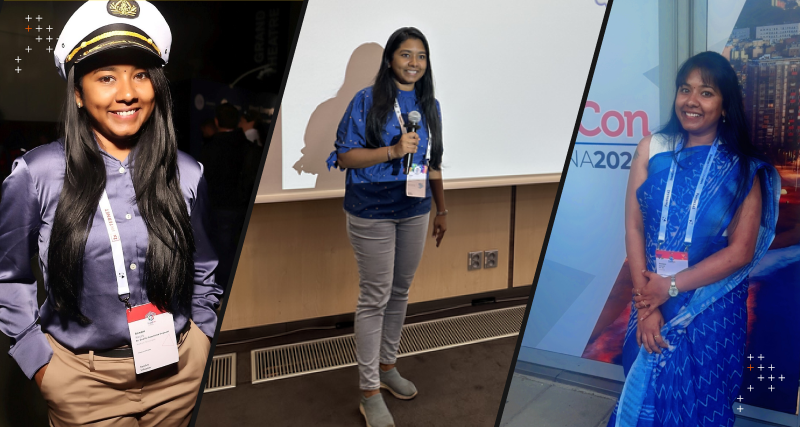Introduction
DrupalCon Europe 2020 is around the corner, and at Axelerant we are thrilled to join this global virtual event. It’s the perfect opportunity to get together as a community to seal an exceptional year, filled with challenges but also with new opportunities and wins worthwhile sharing and celebrating.
The theme for this DrupalCon Europe is “The Power of The Open Web,” something that we firmly believe in and the reason why our team will be attending, speaking, and volunteering, as we have in previous years.
With 4 keynotes, 119 sessions, 4 workshops, Birds of Feather, and fun social events, we’re looking at an exciting virtual conference. It will be held on EventsAir, a platform that promises many interactive opportunities to connect and network, and where we’ll probably meet.
So which sessions are we giving?
 Shweta Sharma,
|
Automated Advanced Visual Regression TestingSession track: Agency & business |
In this era of Digital transformation, clients have been demanding shorter and quicker releases. Shorter and quicker releases mean your team should not only be able to develop them at the required pace but also test and release them at a sustainable pace. User interface plays an important role in the client's business and there are organizations that release new features, fancy CSS regularly that support multiple browsers, multiple Operating systems, mobile devices. Verifying the frontend on this browser/device/OS matrix by humans is not only extremely time consuming but also prone to human errors. In fact, testing by humans should primarily focus on discovery leaving the repetitive and error-prone tasks to tools. Hence, automating Visual tests is becoming less of an optional activity and more of a must-have activity within the team. Ensuring visually perfect user experiences is equally important as to have the functionality working.
Key takeaways: Automated Advanced Visual Regression Testing
At the end of the session, attendees will learn about:
- What is Automated Visual regression testing?
- How does it work?
- What are the advantages of using it?
- What are the challenges associated with it and potential solutions?
- What are the good practices associated?
- What are the tools available in the market?
- When to use what?
- How can you get started with it?
- Introducing Visual automation in your CI cycle
 Prateek Jain,
|
 Akanksha Singh,
|
Your Drupal Site Personalized Like NetflixSession Track: Clients & industry experiences Room: Barcelona Starts at: Dec 08, Tuesday - 12:50 UTC Duration: 20 minutes |
Drupal is the CMS of choice when it comes to creating content-rich sites. However, it is no longer enough to display the same content to all users. In a world where diversity is increasingly obvious and celebrated, websites have to step up their game and adapt to a wide range of users and their preferences. This is where Personalisation comes in. While Netflix personalization is complex and composed of thousands of algorithms, it can be broken down into distinct use cases which can then be solved independently. Here, we will try to explain how Netflix’s personalization approaches to display tailored content to each user can be implemented in Drupal using existing modules and technologies.
Presentation Flow:
Your Drupal Site Personalized Like Netflix
- Why Personalize
- Understanding Netflix personalization use-cases
- Getting started with Personalization your Drupal solution
- Comparison of existing modules/technologies
- Solving Netflix like personalized use-cases in Drupal
- Applying modules to different use-cases
- Comparing different Drupal personalization modules for solving the same use-case
 Hussain Abbas,
|
Migrate to DrupalSession track: Makers & builders |
Drupal allows building highly complex content structures ranging from simple blogs to online stores to advanced enterprise publishing with complex content approval workflows. Migrating content into such complex structures is a complex problem for which Drupal provides a simple framework in the form of the migrate module. The module allows data migration from various sources to Drupal in a structured approach—a way that can be controlled, monitored and audited.
In this session, we’ll go over the Drupal migration system for migrating all sorts of content to Drupal (and that includes migrating/upgrading from older versions of Drupal as well). Drupal 8 and 9 use the same migration system to update from Drupal 6 or 7. Given the Drupal 7 EOL approaching soon and Drupal 9 release, it is imperative that developers understand how to write migrations. In this session, you will learn:
- Understand the migrate module and declarative programming
- Planning a migration and opportunity to restructure content and modify data
- Different parts of a migration
- Clear and complete mappings
- Reuse code across migration classes with inheritance and traits
- Continuous or incremental migration
- Migration performance
- Auditing migrations by stakeholders and verification
- Debugging migrations and common gotchas
Key Takeaways: Migrate to Drupal
We will look at these topics in the context of both Drupal 7 and Drupal 8 where migrate module has been moved into core. While the migrate module has changed in Drupal 8 in its architecture, much of the concepts remain the same. Understanding this architecture helps in understanding the internals of migration and writing better migrations. You will explore key tools that simplify the experience when writing and managing migrations. You will walk away ready to:
- Understand migrations in Drupal 7 and Drupal 8/9
- Communicate migration in detail to project stakeholders
- Write efficient migrations
- Run the migrations efficiently
 Akanksha Singh,
|
Write Code Once, Run Anywhere - Drupal + FlutterSession Track: Makers & builders |
With the release of Drupal 9, we have come closer to our goal of being API-first. Decoupled architecture is becoming increasingly popular as it allows greater flexibility and better designs. But even today, the biggest challenge for any project is having to maintain multiple code bases for web and native apps. This is the problem that Flutter aims to solve. Join Akanksha Singh in this session to build a basic flutter app from scratch with Drupal 9 as a content delivery network.
 Sreekar Achanta,
|
Contanerisation And Orchestration Of Mautic ApplicationSession Track: Makers & builders |
Mautic is an open marketing software platform that provides the greatest level of integration and deep audience intelligence, enabling you to make more meaningful customer connections. Some of the challenges clients faced include the scalability of their application during their intensive marketing campaigns and maintenance of the application such as periodic updates to Mautic. Mautic application as it exists, is not totally enterprise-ready and not in line with 12 Factor Application philosophy. There are multiple configuration files to inject environment variables. Mautic has an open-source image but it is hardly ready to be deployed on Kubernetes, let alone enterprise-ready. The ephemeral and persistent components such as logs, cache are not decoupled. The existing mautic image also runs multiple processes in the same container, which is an anti-pattern in containerization.
Come join me and learn how we have solved the customer’s issue from running the application on virtual machines and manual deployments, this project has made it easier for the client to make frequent releases and also enhanced the availability of the application. The self-healing nature of Kubernetes combined with the auto-scaling features AWS offered, the application is highly resilient. The GitLab CI/CD pipelines make it a breeze for developers to deploy. The multi-dev deployment paradigm ensures every feature is thoroughly tested before the new features are launched onto production.
Key Takeaways: Contanerisation And Orchestration Of Mautic Application
- Architectural design for the application.
- How we decoupled different components and made use of native Kubernetes services to address the problems.
- How the docker image updates were managed efficiently
- How the different configurations are aligned and brought into one config file i.e. config.php
- Security considerations.
- 12 Factor app methodology.
 Jaspreet Singh,
|
Why Is Automation Knowledge Needed For A Project ManagerSession Track: Agency & business |
We want to follow industry standards with our websites and apps. If the project managers understand the automation testing process and workflow that will change the picture overall and can also reduce the dependency on the people.
This session is for people who want to understand the process and workflow of automation and want to lead the process without any dependency.
Key Takeaways: Why Is Automation Knowledge Needed For A Project Manager
- Why a project manager needs to understand the Automation process.
- What are the purpose and needs of the automation for the project manager?
- How to manage automation backlog without QA?
- How the automation reporting system works
- What is the problem statement?
Target Audience
This session is for QA/Project managers who want to learn more about the automation process and workflow.
 Nathan Roach,
|
 Piyush Poddar,
|
Drupal Agency Partnerships: Stronger, TogetherSession Track: Agency & business |
The Drupal agency landscape is always changing. And for many Drupal agencies in a post-COVID-19 world, the terrain has become rough—and in some cases, inhospitable. Director of Marketing, Nathan Roach, and, Piyush Poddar, will be hosting a conversation to share best practices. Let’s look at what data we have on the state of Drupal business at agencies today, listen in to the perspectives of Agency Leaders, and explore new ways of being better, together.
You can also join us at Birds of a Feather (BOF)
 Surabhi Gokte,
|
 Pierina Wetto,
|
The More You Give, The More You Get: Calling All Community Managers And EnthusiastsBoF Sessions |
“Come for the code, stay for the community” is the famous motto among Drupalers for a good reason. We invite Drupal Community Managers, Ambassadors, and enthusiasts to join us, share learnings after a year of pandemic and thoughts to continue growing a sustainable community in 2021.
PS. I’ll be volunteering as a moderator for various sessions, so I’ll see you around. Don’t forget to say Hi or DM if you have any questions.


 We respect your privacy. Your information is safe.
We respect your privacy. Your information is safe.



Leave us a comment